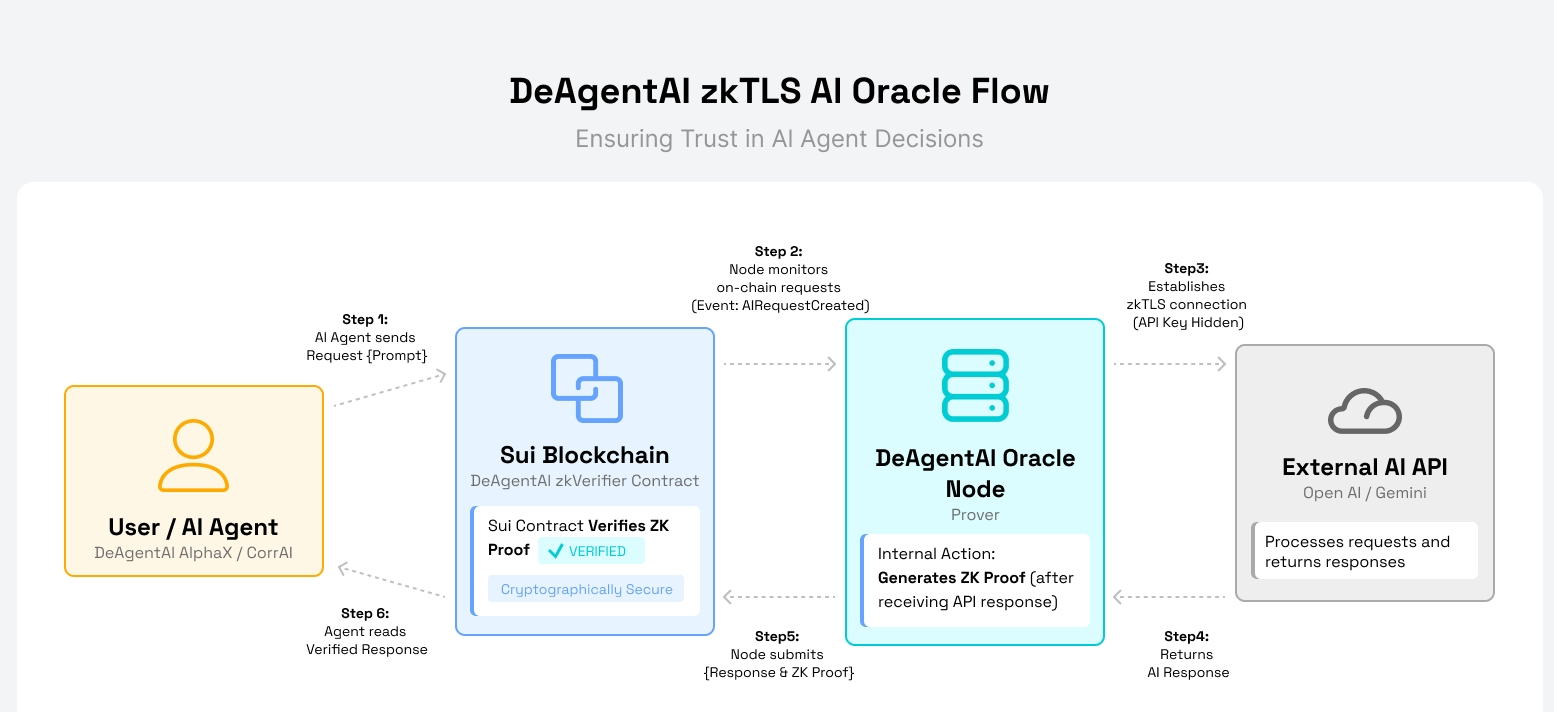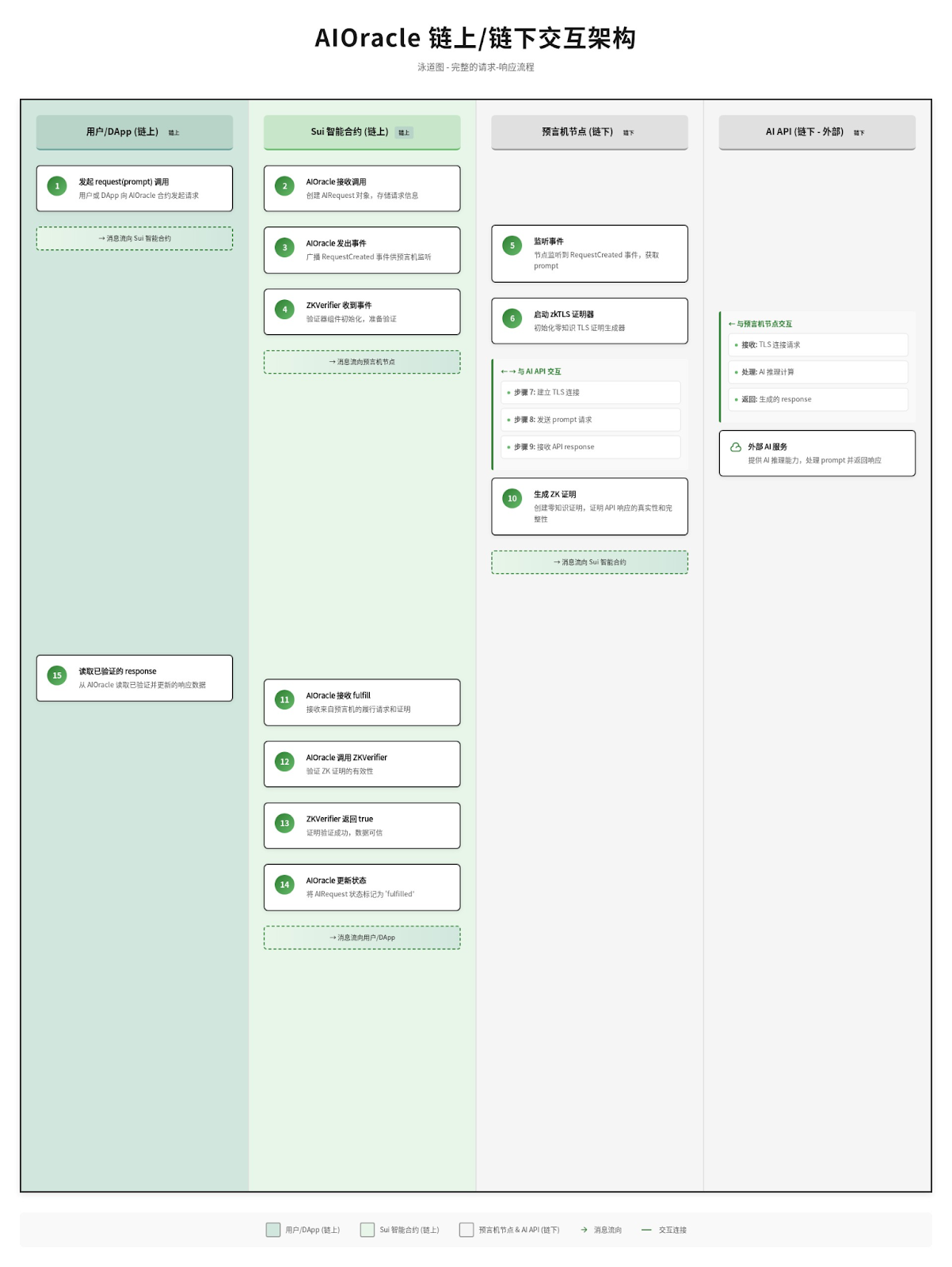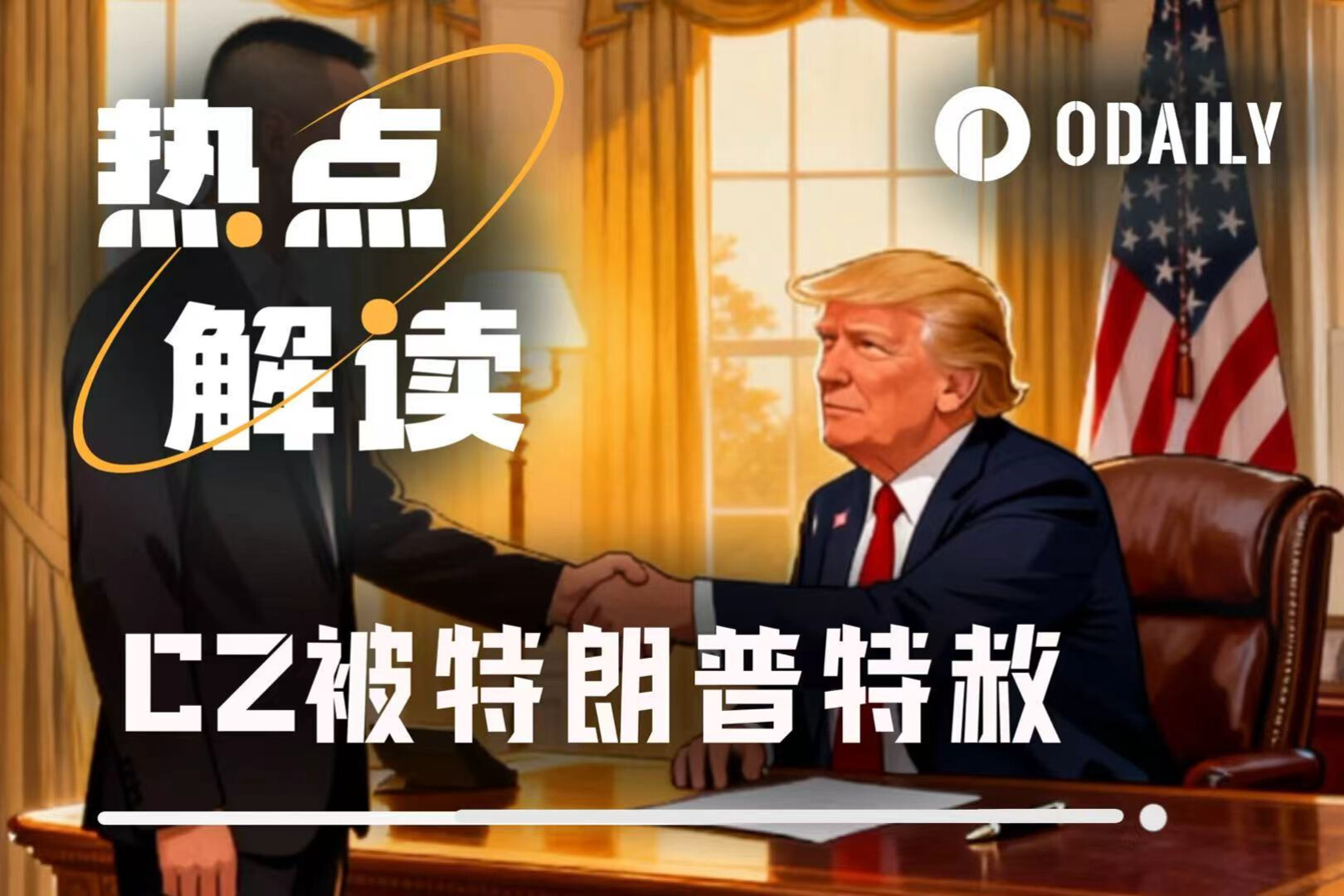
The Double Boom of AI
The current crypto space is being activated by two explosive narratives: the rise of the autonomous AI agent economy and the parallel boom of on-chain prediction markets. The wave, exemplified by the x402 protocol, is standardizing how intelligent agents "pay" for API calls. Meanwhile, platforms like Polymarket are demonstrating that "pricing collective intelligence" is a multi-billion dollar market.
These two trends are converging on a single, crucial dependency: data. AI agents must consume external data to inform their decisions; and a prediction market without reliable oracles to settle its outcomes is useless!
The widespread adoption of x402 has turned this theoretical problem into an urgent reality: when an AI agent can autonomously pay to call any API, how can it trust the returned results? This has given rise to a huge, high-risk demand: the need for an oracle that can reliably input information from the external world (Web2) into the blockchain (Web3).
The "Bug" of Traditional Oracles
This is precisely the shortcoming of the mainstream oracle model, generally known as "reputation-based consensus".
Traditional oracles (like Chainlink) are designed for simple, publicly available, and easily verifiable data. For example, to obtain the price of SUI/USD, a decentralized oracle network (DON) only needs 20 independent nodes to query 10 different exchanges and then report the median. If a node lies, it will be voted out.
However, the model breaks down when the data becomes complex, private, and uncertain.
Suppose an AI agent needs to execute high-value transactions based on a complex prompt sent to OpenAI:
- Privacy Bug: The agent cannot use its proprietary Prompt, and more importantly, it cannot broadcast its API_KEY to 20 different nodes.
- Consensus Bug: Even if it were possible, 20 different nodes asking OpenAI the same complex question might result in 20 slightly different, non-deterministic answers. There is no "median" to vote on.
This forces agents to do something that a trustless system should never do: trust a single, centralized oracle node. The entire security of a multi-million dollar protocol now hangs on the "hope" that this single node hasn't been hacked, isn't malicious, or hasn't returned a false result for the sake of convenience.
A deeper question: Trust-based AI oracles
You might think: Isn't the solution simply to let the AI Agent directly call the API?
However, this idea is too simplistic. The smart contracts on Sui themselves cannot send HTTPS requests to OpenAI. It is a closed, deterministic system. It must rely on an off-chain participant to "transfer" data.
The seemingly obvious solution is to create a dedicated "AI oracle" that simply calls the API and returns the result. However, this doesn't solve the core problem. The smart contract is still blindly trusting that node. It cannot verify:
- Did this node actually call api.openai.com?
- Or did it call a cheaper, but seemingly malicious, server?
- Did it tamper with the response to manipulate a prediction market?
This is the real impasse: the AI agent economy cannot be built on "reputation," it must be built on "proof."
Solution: DeAgentAI zkTLS AI Oracle
This is precisely the challenge that DeAgentAI, as a leading AI Agent infrastructure, is committed to solving. Instead of building a "more trustworthy" oracle, we built an oracle that doesn't require trust at all.
We achieve this by shifting the entire paradigm from reputational consensus to cryptographic consensus. The solution is a dedicated AI oracle built on zkTLS (Zero Knowledge Transport Layer Security).
The diagram below illustrates the complete interaction architecture between the AI Agent, the Sui smart contract, off-chain nodes, and the external AI API:

How it works: "Cryptographic Notary"
DeAgentAI's oracles should not be viewed as a messenger, but rather as an internationally recognized "cryptographic notary".
Its technical workflow is as follows:
- Off-Chain Proving: The DeAgentAI oracle node (an off-chain component) initiates a standard, encrypted TLS session with the target API (e.g., https://api.openai.com).
- Privacy-Preserving Execution: Nodes securely send a prompt using their private API key (Authorization: Bearer sk-...). The zkTLS authentication system records the entire encrypted session.
- Proof Generation: After the session ends, the node generates a ZK proof. This proof acts as a "notary's seal," cryptographically proving the following facts simultaneously:
"I connected to a server that has an official certificate for api.openai.com."
"I sent a data stream that included a public prompt."
"I received a data stream containing a public response."
"All of this was done while the Authorization header was demonstrably hidden (edited), and the header information remained private."
- On-Chain Verification: Subsequently, the node calls the AIOracle smart contract on the chain, submitting only the response and proof.
This is where the miracle happens, as DeAgentAI's Move-based architecture demonstrates:
Code snippet
// A simplified snippet from DeAgentAI's AIOracle contract
public entry fun fulfill_request_with_proof(
Oracle: &AIOracle,
Request: &mut AIRequest,
response: String,
server_name: String, // eg, "api.openai.com"
proof: vector<u8>, // The ZK-proof from the off-chain node
ctx: &mut TxContext
) {
// --- 1. VALIDATION ---
assert!(!request.fulfilled, E_REQUEST_ALREADY_FULFILLED);
// --- 2. VERIFICATION (The Core) ---
// The contract calls the ZKVerifier module.
// It doesn't trust the sender; it trusts the math.
let is_valid = zk_verifier::verify_proof(
&proof,
&server_name,
&request.prompt,
&response
);
// Abort the transaction if the proof is invalid.
assert!(is_valid, E_INVALID_PROOF);
// --- 3. STATE CHANGE (Only if proof is valid) ---
request.response = response;
request.fulfilled = true;
event::emit(AIRequestFulfilled {
request_id: object::id(request),
});
}
The `fulfill_request_with_proof` function is permissionless. The contract doesn't care who the caller is; its only concern is whether the proof is mathematically valid.
The actual cryptographic task is handled by the zk_verifier module, which performs mathematical operations on-chain to check the "notary's seal".
Code snippet
// file: sources/zk_verifier.move
// STUB: A real implementation is extremely complex.
module my_verifier::zk_verifier {
use std::string::String;
// This function performs the complex, gas-intensive
// cryptographic operations (eg, elliptic curve pairings)
// to verify the proof against the public inputs.
public fun verify_proof(
proof: &vector<u8>,
server_name: &String,
prompt: &String,
response: &String
): bool {
// --- REAL ZK VERIFICATION LOGIC GOES HERE ---
// In this example, it's stubbed to return `true`,
// but in production, this is the "unforgeable seal."
true
}
}
This architecture separates the AIOracle business logic from the ZKVerifier cryptographic logic, resulting in a clear modular design that allows the underlying proof system to be upgraded in the future without halting the entire oracle network.
Economic Impact: From "Data Costs" to "Trust Value"
Existing oracle giants (such as Chainlink) have done an excellent job in the "public data" market, where their core business is providing price data like SUI/USD for DeFi. This is a market based on "redundancy" and "reputation consensus" (N nodes voting), and its economic model is based on paying for data .
DeAgentAI is targeting a completely new blue ocean: the incremental market (private/AI oracles). This is a market where AI agents, quantitative funds, and institutions need to access private APIs, non-deterministic AI models, and confidential data. This market is currently almost non-existent, not because there is no demand, but because it is completely locked down by the "trust dilemma."
DeAgentAI's zkTLS oracle is not intended to compete with traditional oracles in the "price data" red ocean market, but rather to unlock the trillion-dollar "autonomous intelligent agent economy" market that has been unable to start due to a lack of trust!
Redefining Costs: "Gas Costs" vs. "Risk Costs"
Our zkTLS oracle verifies ZK proofs on-chain, which currently consumes a considerable amount of gas. This may seem "high-cost," but it's actually a misinterpretation. We must distinguish between these two costs:
- Gas cost: The on-chain fee paid for a verifiable, secure API call.
- Risk Costs: The potential loss of millions of dollars due to AI agents making incorrect decisions by trusting an opaque, centralized oracle node.
For any high-value AI agent, paying a controllable "gas cost" in exchange for 100% "cryptographic certainty" is a far cheaper economic option than bearing unlimited "risk costs".
We are not "saving costs," we are "eliminating risks" for our users. It is a kind of economic "insurance" that transforms unpredictable catastrophic losses into a predictable, high-level security expense.
Why DeAgentAI: Why are we so important?
We have solved the most challenging yet often overlooked problem in the AI Agent economy: trust.
The x402 protocol resolves the friction of "payment," but it only completes half the problem. An AI agent paying for data without being able to verify its authenticity is unacceptable in any high-value scenario. DeAgentAI provides the missing half: a verifiable "trust layer."
We were able to do this not only because we had the right technology, but also because we had proven its market viability.
First: We serve an established infrastructure, not a laboratory.
DeAgentAI is already the largest AI agent infrastructure across the Sui, BSC, and BTC ecosystems. Our zkTLS oracle is not a theoretical white paper; it is built for the real, massive needs of our ecosystem.
- 18.5 million+ users (USERS)
- Peak daily active users (DAU) exceeded 440,000.
- 195 million+ on-chain transactions
Our zkTLS oracle is designed for this proven high-concurrency environment, providing our vast ecosystem of users and agents with the essential trust services they desperately need.
Second: From day one, we chose the right and unique architecture, and our market leadership stems from our strategic choices regarding our technology roadmap.
- Cryptographic Consensus vs. Reputation Consensus: We firmly believe that the "consensus" problem of AI agents cannot be solved through "social voting" (node reputation), but must be solved through "mathematics" (cryptographic proof). This is the fundamental difference between us and traditional oracle models.
- Native Privacy and Permissionless Operation: DeAgentAI's zkTLS implementation solves the API key privacy issue at the protocol level, a rigid requirement for any professional-grade AI agent. Meanwhile, the permissionless nature of `fulfill_request_with_proof` means we've created an open market where authentication is the only thing that matters, not the person.
- Modularity and Future Compatibility: As mentioned earlier, DeAgentAI engineers intentionally separated the AIOracle (business logic) from the ZKVerifier (cryptographic verifier). This is a crucial design choice. With the rapid development of ZK cryptography (such as STARKs and PLONKs), we can seamlessly upgrade the underlying ZKVerifier module to achieve lower gas costs and faster verification speeds without disrupting or migrating smart contracts across the entire ecosystem. We are built for the next decade of AI development.
Conclusion: From "Trust Messenger" to "Verification Message"
DeAgentAI's architecture represents a fundamental shift: from "trust messenger" to "verification information." This is a paradigm shift necessary for building a truly autonomous, trustworthy, and high-value AI agent economy. The x402 provides the payment track, while DeAgentAI provides the indispensable "security and trust" guardrails on this track.
We are building the trustless "central nervous system" for this coming new economy. For developers looking to build the next generation of trustless AI agents, DeAgentAI provides the most solid foundation of trust.
Official Link:
- Website: https://deagent.ai/
- Twitter: https://x.com/DeAgentAI
- Discord: https://discord.com/invite/deagentaiofficial
- Telegram: https://t.me/deagentai
- CoinMarketCap:https://coinmarketcap.com/currencies/deagentai/
- Dune Analytics:https://dune.com/blockwork/degent-ai-statistics
- 核心观点:AI与区块链融合需可信数据预言机。
- 关键要素:
- 传统预言机无法处理私有复杂数据。
- DeAgentAI采用zkTLS技术确保数据可信。
- 实现密码学共识替代声誉共识。
- 市场影响:解锁万亿级AI Agent经济市场。
- 时效性标注:长期影响



